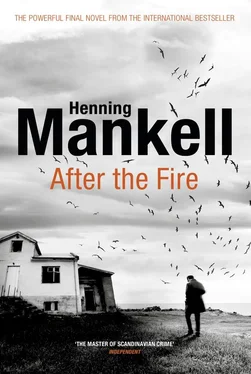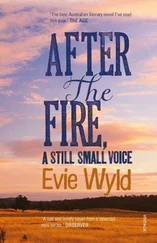We were approaching the depths of winter. Almost every year there is a point when the islands and bays close their doors. No one is allowed in or out. The shops are shut, the curtains drawn. Sometimes it happened as early as the end of November or the beginning of December, sometimes not until February.
In some years the archipelago didn’t close down at all. My grandfather used to say that if the sea didn’t ice over and the snow didn’t cover the skerries, then come summer the fishing would be poor. I had once asked Jansson if that was true, and he had firmly answered no. However, when I told him that was what my grandfather had said, he immediately changed his mind.
The nauseous feeling in my head had now turned into a vague, nagging pain. I decided to row across to my tent. Perhaps I had spent too long sitting at the table in the caravan and needed some exercise. I went down to the boathouse and pushed out the skiff. There wasn’t a breath of wind. I rowed with powerful strokes and immediately started sweating. After every fifteenth stroke I rested on the oars for a moment before carrying on.
When I was five years old, my grandfather built a little boat for me to play with. He used Masonite board, with a prow and stern made of pine and oars of alder. That boat had been my most cherished possession throughout my childhood.
Could I make something similar for Agnes? Probably not; it was far too big a job for an inexperienced carpenter. However, perhaps I could ask Kolbjörn Eriksson? I had heard that he was exceptionally talented in the skilled art of boatbuilding.
I reached the skerry and pulled the skiff ashore. The tent was securely anchored in the little hollow; I had come over to check on it every time we had had high winds, but it had stood firm.
I immediately saw that I had had visitors. The bank of stones forming a wall around the cooking area had grown, and someone had made a hook on which to hang a pot to boil water. I opened the tent flap and was struck by a smell I recognised: acetone. Could my mysterious visitor be a woman? Acetone made me think of nail polish, which Harriet had used. And hadn’t Louise been wearing nail polish when I saw her in Paris?
Of course I also realised that there was a more disturbing possibility: acetone is an important ingredient in the production of synthetic drugs, above all the narcotic known as Spice. Was a junkie seeking refuge in my tent from time to time?
I found this idea upsetting. All my life I have felt antipathy towards those who sully their lives with drugs. As a surgeon I often had to operate on someone who had taken something and been involved in an accident, or been stabbed in a dispute over those expensive commodities. As they lay there on the table, helpless under the knife, I frequently thought that I was doing what I was supposed to do, but that I really didn’t care what happened to them afterwards.
When I attempted to discuss this with my colleagues, none of them seemed to agree with me. I soon gave up, deciding that I was probably ill-suited to my profession when it came to my views on the value of certain individuals.
No doubt that was partly why the smell in the tent bothered me so much. I crawled outside, closed the flap, wondered whether I ought to take down the tent, then went on a tour of inspection around the skerry. In a crevice, neatly covered by torn-up moss, I found a small rubbish heap. I rooted through the empty milk cartons and bread wrappings and came across a scrap of black rubber. At first I thought it was a piece of a tyre from a bicycle, then I realised it was actually neoprene and therefore more likely to have come from a diving suit. However, this was an unsatisfactory conclusion; no one dived in the waters off these islands in the winter. Nor could it have drifted ashore on the southern side of the skerry where I found it; the wind out here is almost always offshore.
So it couldn’t be part of a diving suit. All of a sudden I knew: it came from a wetsuit worn by surfers to keep out the chill from the wind and water. My visitor was the black-clad windsurfer who had turned up in the autumn and on several occasions had headed out towards the open sea with his board and his sail.
I stood scanning the horizon, but there was nothing to see except the banks of cloud slowly drifting in from the Gulf of Finland.
I walked around the skerry again, but I couldn’t find any more clues.
I didn’t have time to worry about the identity of my visitor. As I set off for home I decided it was the moment to tackle the insurance company so that the construction of the new house could get under way. I didn’t have time to wait, either for my own sake or for the sake of my daughter and granddaughter.
From time to time I rested on the oars and gazed down into the dark water, hoping to spot another drift net floating silently along in the depths like a predator seeking its prey. But the sea was empty and black, with no hint of light.
Back on the island I pictured the new house slowly rising from the ruins. Even though all my photographs had been destroyed in the fire, I knew that the local history association had commissioned a photographer to document all the houses and boathouses in the archipelago during my grandparents’ day. The pictures were kept in the association’s archive collection. I should have thought of that when I was at the meeting; Wiman was the archivist and would have been able to help me.
I had been asked to join the association’s board more than once, but I had always refused, feeling slightly more guilty each time. Jansson, who had served on the board several times, had told me there were no more than four meetings a year; the work was not arduous. It was an important organisation that did a great deal to fight for those who lived in the archipelago.
However, I knew that Jansson wasn’t telling the whole truth. I had heard rumours, even without Jansson’s assistance; there were deep divisions between various members and groups. At times it seemed as if open warfare raged between different factions. I had never really understood the reasons behind this seething tension, but something told me it was essentially down to the fact that there was only one dung heap and far too many aspiring cockerels.
I called Wiman; I began by saying how well I thought he had handled the meeting, then I asked about photographs of my house. He promised to look through the archive to see what he could find.
‘Things weren’t kept in particularly good order in the past,’ he said. ‘The archive is in a state somewhere between chaos and a complete mess, created by the archivists with the apparent aim of making it impossible to find what you’re looking for.’
He was in danger of tipping over into his preacher’s voice, so I quickly ended the call.
I spent the next few hours playing poker with myself. It’s the saddest expression of loneliness I know. I never feel more overwhelmed by weariness and unhappiness than when I’m trying to win money off myself. There is no deeper form of isolation.
I sat there for a long time that evening making notes about the new house; I hoped to start building in the early spring. There was no need to lay new foundations, so it was just a matter of removing the burned-out ruins. I intended to ask both Jansson and Kolbjörn Eriksson for advice; I would ignore whatever Jansson said, but I didn’t want to incur the sullenness and ill will that would follow if I didn’t consult him. Kolbjörn was the one I trusted.
That night I dreamed of caves. I was wandering around in a darkness that became so heavy I could hardly breathe. At that point I woke up. There were mice scampering around on the roof of the caravan. I listened for the wind, but all was calm.
For a brief moment I thought I might never wake up if I went back to sleep. Death was suddenly very close.
Читать дальше












